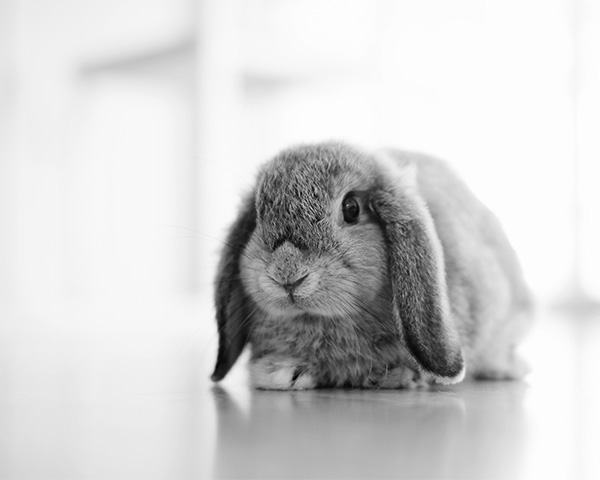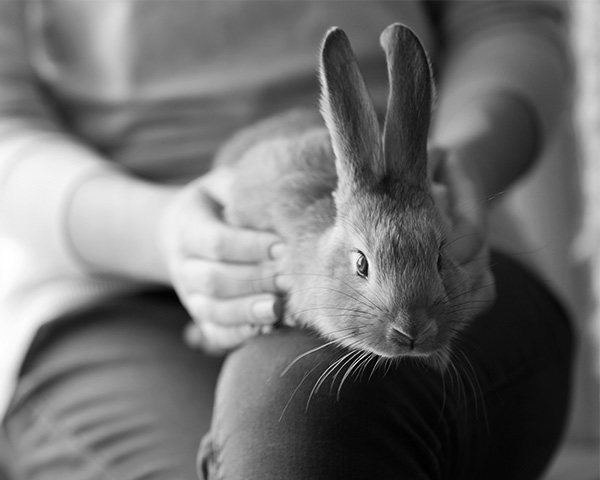Caring for your rabbit’s teeth
When you think of a rabbit, their adorable buck teeth usually come to mind. It’s this iconic feature that needs regular checks to make sure your cuddly bunny is in good shape.
Rabbits have 28 teeth in total:
- Two upper and lower incisors
- Two peg teeth (tiny incisors beside the main top ones)
- 12 molars and premolars on the upper jaw
- Ten molars and premolars on the lower jaw
A rabbit’s teeth are “open rooted”, which means they grow continuously throughout their life . When they chomp on their food, their teeth are constantly worn down and renewed, so there’s no need for brushing.
Cute as they are, your rabbit’s teeth are prone to dental problems, often caused by bad diet. Hay and grass are vital to a bunny’s diet, so they should always have hay in their cage to chew and wear down their molars.
Genetics can also affect rabbit teeth. Selective breeding over time can sometimes lead to uneven jaws, making tooth wear difficult. Rabbits with shorter jaws and rounder faces, like the Holland Lop or Netherland Dwarf , are more prone to these dental issues.
Frequent dental checks can help to detect any rabbit teeth problems. Your vet will thoroughly examine your bunny’s teeth during checkups. But you should also carry out your own inspections every week.
Things to watch out for when it comes to your rabbit’s teeth
Checking your rabbit’s teeth might take some practice. Wrap them in a towel with their head exposed and gently place them on your lap. With your fingers or a tongue depressor, carefully lift your bunny’s lips and examine their incisors.
Other things to keep an eye on include:
Grinding
Rabbits quietly grind their front teeth when they are happy or relaxed – known as purring. But if your rabbit’s teeth grinding is loud with a clicking or popping sound, this could be a sign or stress or pain.
Overgrown teeth
Overgrown rabbit teeth are one of the most common issues affecting bunnies. This can be caused by malocclusion (an inherited genetic disease), poor diet or mild trauma. When the rabbit’s teeth overgrow, they can become misaligned or misshapen, affecting their bite or chew .
Diet
A balanced, high-fibre diet can keep your rabbit’s teeth worn and healthy. Along with fresh, clean water, you should also feed your bunny:
- Hay: Timothy, orchard or brome hay keeps their teeth grinding and their digestive system healthy.
- Vegetables: Daily portions of leafy green vegetables like romaine lettuce, bok choy, basil, broccoli greens and carrot tops.
- Pellets: Timothy and alfalfa pellets are high in protein and vitamins B and K.
Signs of rabbit dental diseases
Rabbits are very expressive animals. In most cases, their body language will tell you if they’re feeling discomfort or pain. Some common signs of rabbit teeth problems and dental diseases include:
- Weight loss
- Runny eyes
- Difficulty eating
- Lack of grooming
- Loss of appetite/decreased appetite
- Bulging eyes (from root issues pushing on the eyes)
- Loud teeth grinding
- Increased saliva production
- Dehydration
- Facial swelling
- Diarrhoea
- Difficulty keeping food in their mouth
- Nasal discharge
- Increased tear production
Dental problems can be extremely painful for your bunny. If they manage to disguise their discomfort, weekly dental checkups at home can help you nip these issues in the bud.
Treatment for rabbit teeth
If you suspect your rabbit has teeth problems, you should see to your vet immediately. Your vet or nurse will use a scope to examine their incisors and cheek teeth (molars and premolars).
Overgrown rabbit teeth can be trimmed or reshaped under general anaesthetic. If your rabbit has severe malocclusion, their teeth may need trimming once a month. This can cause stress in rabbits – in which case your vet may recommend removing the teeth completely.
Keep your bunny’s teeth chomping with Sainsbury’s Bank Rabbit Insurance. With our flexible Lifetime cover, you’ll get 24/7 vet assistance and cover for vet bills of up to £2,000 every year. So you can claim for dental treatment and more^.
^This only covers dental treatment as a result of accident and illness. Trimming, burring or rasping teeth is not covered.
Frequently asked questions
How do you take care of rabbit teeth?
A high-fibre diet of hay, grass, vegetables and pellets is important for your rabbit’s teeth. Rabbits chew constantly, and chomping on hay can help to wear down their molars. Regular oral exams and chew toys can also prevent overgrown teeth in rabbits.
Are you supposed to trim rabbit teeth?
Rabbits with overgrown teeth should have their teeth trimmed by a vet. More serious cases of malocclusion may require periodic trimming. This procedure can be stressful for your bunny, so your vet may suggest removing the teeth altogether.
How often should rabbit teeth be checked?
Your vet will thoroughly inspect your rabbit’s teeth during checkups every year. But you should also check your rabbit’s teeth weekly for signs of dental disease. If you spot any problems, consult your vet immediately.

Browse our guides
Choose from our list of helpful guides and information

Browse our rabbit guides
How to care for your rabbit, common health problems and more

Rabbit breed guides
Find out how to keep your rabbit healthy and happy
Terms and conditions
Important information
* The discount is based on information related to you and the Sainsbury’s and Sainsbury’s Bank transactions linked to your Nectar account. For more information on how we use your data, go to sainsburysbank.co.uk/privacy
Sainsbury's Bank plc, Registered Office, 33 Holborn, London EC1N 2HT (registered in England and Wales, no. 3279730) is authorised by the Prudential Regulation Authority and regulated by the Financial Conduct Authority and the Prudential Regulation Authority (register no. 184514). Sainsbury's Supermarkets Ltd is an appointed representative of Sainsbury's Bank plc.
Sainsbury's Bank plc acts as an introducer to Pinnacle Insurance plc who is authorised by the Prudential Regulation Authority and regulated by the Financial Conduct Authority and the Prudential Regulation Authority (register number 110866). Registered Office: Pinnacle House, A1 Barnet Way, Borehamwood, Hertfordshire, WD6 2XX. Sainsbury’s Bank plc and Pinnacle Insurance plc are not part of the same corporate group.
